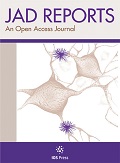Authors: Schütze, Sandra | Döpke, Anika | Kellert, Benedikt | Seele, Jana | Ballüer, Melissa | Bunkowski, Stephanie | Kreutzfeldt, Mario | Brück, Wolfgang | Nau, Roland
Article Type:
Research Article
Abstract:
Background: In patients with Alzheimer’s disease (AD), bacterial infections are often associated with a cognitive decline. Animal models of genuine acute infections with viable bacteria which induce deterioration of neurodegenerative diseases are missing. Objective: We assessed the effect of an intracerebral infection with E. coli in a mouse model of AD. Methods: 13-month-old Tg2576 +/- mice and transgene negative littermates (Tg2576 -/-) received an intracerebral injection with E. coli K1 or saline followed by treatment with ceftriaxone starting 41 h post infection (p.i.) for 5 days. For 4 weeks, mice were monitored for clinical status, weight,
…motor functions, and neuropsychological status using the Morris water maze. ELISAs, stainings, and immunohistochemistry in brains were performed at the end of the experiment. Results: Mortality of the infection was approximately 20%. After 4 weeks, spatial learning of infected Tg2576 +/- mice was compromised compared to non-infected Tg2576 +/- mice (p < 0.05). E. coli infection did not influence spatial learning in Tg2576 -/- mice, or spatial memory in both Tg2576 +/- and -/- mice within 4 weeks p.i.. Necrosis of hippocampal neurons was induced in infected compared to non-infected Tg2576 +/- mice 4 weeks p.i., whereas brain concentrations of Aβ1–40 , Aβ1–42 , and phosphoTau as well as axonal damage and microglia density were not altered. Conclusion: Here, we proved in principle that a genuine acute bacterial infection can worsen cognitive functions of AD mice. Mouse models of subacute systemic infections are needed to develop new strategies for the treatment of bacterial infections in patients with AD in order to minimize their cognitive decline.
Show more
Keywords: Alzheimer’s disease, amyloid-β, cognitive functions, delirium, E. coli, intracerebral infection, neurodegenerative disease, spatial learning, spatial memory, water maze
DOI: 10.3233/ADR-210049
Citation: Journal of Alzheimer's Disease Reports,
vol. 6, no. 1, pp. 101-114, 2022





